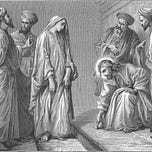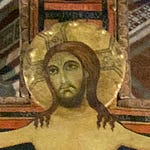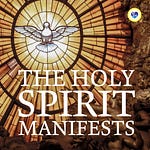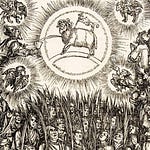This week, the fifth week of Lent we make a dramatic shift from a focus on general discipleship to setting our faces to Jerusalem. Next week we will celebrate Palm Sunday, and we will begin Holy Week. And in less than two weeks, we will celebrate the Passover of the Lord. And this year the readings all highlight the living water, the Holy Spirit. Today we have one of the gospel readings that has captured the imaginations of millions of people. This wild story, where a woman is caught in the act of adultery, and dragged into the temple precincts, and she is about to get stoned. And of course, this episode is a test to see what Jesus will do. They are trying to provoke him so that they have a pretext to claim he is a false prophet, so that they can stone him along with the woman. Lots of people have talked about the obvious facts. No one commits adultery alone. Where is the other party? Was he the married one? And why were all these scribes and Pharisees in the right place at the right time? And of course, the real thing, the thing that everyone is confused about. Why did Jesus stop and write on the ground, and what did the writing say? You have heard me say that Jesus came to establish his Kingdom, and every detail in the gospels is going to tell us something about the Kingdom. There are no random details in the Bible, and especially in John's gospel. So in order to understand this story, we need to look at the larger context. In John chapter seven we are told that the tensions around Jesus have increased, and that it is now too dangerous for him to go to Jerusalem with his disciples. In John's gospel we get a sense that Jesus and his entrourage used the pilgrimage feasts as an opportunity to reach a larger audience, and Jesus was in and out of Jerusalem on a regular basis. It is the feast of Sukkot, and it is six months before the important Passover at the end of the life of Jesus. And Jesus says, "go on without me." Sukkot was a major event and the city was full of light at night. And on the last day of the feast, as John describes it, the great day, Jesus appears. There was a ceremony at the end of Sukkot where the priests would try and enact the scene depicted in Ezekiel 47, when water would begin to pour out of the south end of the temple and it would become a fount of living water for the whole world. It was all about the Holy Spirit. They were waiting and anticipating a Messiah who would release the Holy Spirit. And so the priests would take vats of water and they would pour water off the side of the temple in hopes of getting the water to flow. It was an enactment but also an attempt to "prime the pump." And at that moment, out of the crowd, Jesus stands up and cries "If any man thirst, let him come to me and drink. He that believeth in me as the scripture has said, out of his belly will flow rivers of living water." So Jesus makes several points, and these are going to be re-emphasized over the next two weeks. First, the water is the Holy Spirit, and he is the source of that water. If you come to Jesus you will experience a release of the Holy Spirit that will flow out of your body. And the second, in his Kingdom, the temple is your body. His body is the temple of the Holy Spirit. And that body is going to be opened, and when it does, he is going to make it possible for us to become temples of the Holy Spirit. And our bodies will become temples, and we will be the new temple that Ezekiel promised, and a river of living water will flow out of each of us. That's the promise. That is the New Covenant. It is all about the Holy Spirit. After Jesus does this, they rise up to oppose him, and Nicodemus stops the crowd from stoning him on the spot. The next morning, Jesus comes down into Jerusalem, and enters the temple. And it says they brought the woman, and they tempted and accused him. They were trying to get him to contradict the law. And Jesus does not say a word. He stoops down and takes his finger, and begins to write in the dust, as though he heard them not. He ignored his accusers. And they began to challenge him again, and he spoke. He who is without sin, let him cast the first stone. And then he knelt down again and began to write in the dust. And they began to depart, from the oldest to the youngest. So what is going on here? Jesus wrote in the ground twice with this finger. And they all walk away. Remember what happened the day before, Jesus said he was the living water. And they rejected him. Listen to Jeremiah 17:13: O Lord, the hope of Israel, all who forsake thee shall be put to shame; those who turn away from thee shall be written in the earth, for they have forsaken the Lord, the fountain of living water. Other translations say "their names will be written in the earth" Jesus was enacting a passage from Jeremiah, and not only that, fulfilling the promise that they would forsake the Lord the fountain of living water. And they saw their names in the dust, and they went away one by one. They knew the gravity of what Jesus was doing. They knew this wasn't about the woman, or about trapping Jesus. This was about attempting to bring about the Kingdom without the Christ and rejecting the hope of Israel, the fount of Living Water. And in rejecting him they were being written in the dust. And the accusers left. And Jesus says to the woman, "Where are your accusers, and who will condemn you?" And Jesus says "Neither do I condemn you. Go and sin no more." There is therefore no condemnation for those who are in Christ Jesus for the law of the spirit of life in Christ Jesus has set me free from the law of sin and death. (Romans 8:1) This wasn't about adultery. It was about the water. About the fount of living water. Benny Hinn pointed out in a recent talk that the pattern in scripture is the Father speaks the word, the Son does what he sees the Father doing, and the Holy Spirit manifests. We see this pattern in creation. And we see it in the history of our community. God gave me a word to pray for a house and raise up an army of artists, and then Jesus activated that word. We have not seen the full manifestation, and it has caused me to cry out to the Holy Spirit to begin to manifest the promises. This begins when we make a low pressure zone around us that attracts the wind of the Holy Spirit. As we prepare for the Passover of the Lord, we are going to take some time for corporate reconciliation today. Traditionally, we call this the Rite of Forgiveness. Our church used to do this at the end of Lent, and it is a practice from the Byzantine church, who did this at the beginning of lent. We want to be a body that is flowing in the holy Spirit, and awash with the rivers of living water. The Rite of Forgiveness Priest: Brothers and sisters, forgive me, a sinner, all the sins I have committed this day and all the days of my life, in thought, word, and deed, both outwardly in my body, and inwardly in my soul. Response: May God forgive you and have mercy on you, Bless, reverend father, and forgive us sinners the sins we have committed this day and all the days of our lives, in thought, word, and deed, both outwardly in our bodies, and inwardly in our souls. Priest: Almighty God have mercy on you, forgive you all your sins through our Lord Jesus Christ, strengthen you in all goodness, and by the power of the Holy Spirit keep you in eternal life. Amen. Brothers and sisters, forgive me for all the ways I have not fulfilled my call to lead and shepherd, for any hurts or disappointments I may have caused, and any way I may not have been a living example of our Lord in my teaching, my leadership, or my life. Response: May God forgive you and have mercy on you, and we forgive and release you from any of our expectations or hurts. Bless, reverend father, and forgive us for any ways we have not prayed for you, spoken ill of you, or judged you, and any ways we have not supported you in the mission of the gospel and failed in our calling as members of the body of Christ. I forgive and release you. May the Lord Almighty, + Father, Son, and Holy Spirit, forgive us our sins, and give us the grace and consolation of his Holy Spirit to hereafter lead a sober, godly, and righteous life. Amen.
What did Jesus Write?
The woman, the water, and the dust.
Apr 07, 2025













Share this post